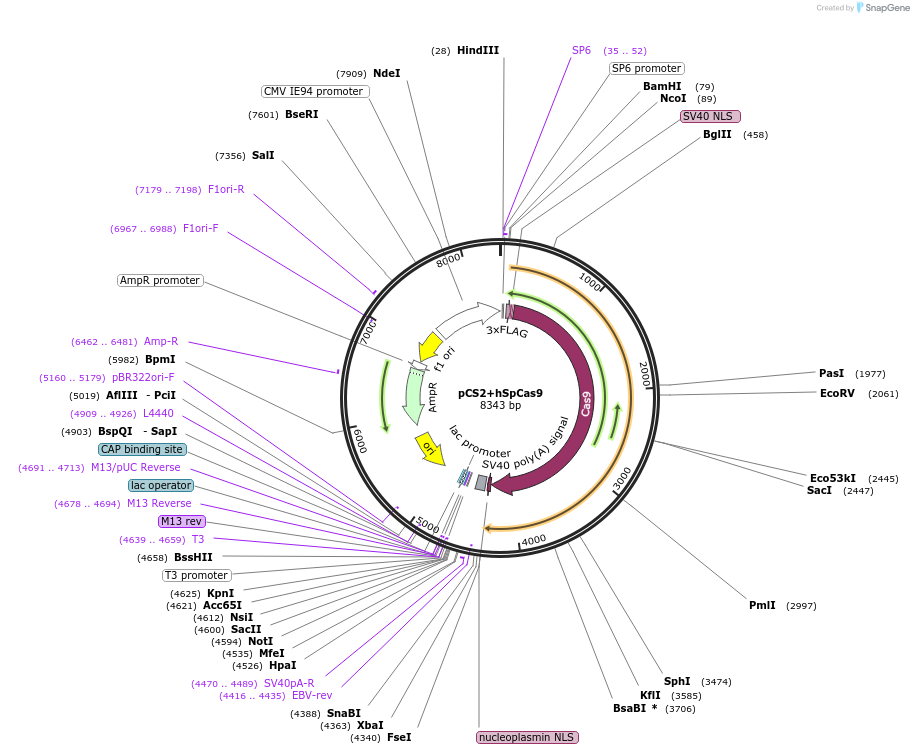-
PurposeEncode hSpCas9 for in vitro transcription with Sp6
-
Depositing Lab
-
Sequence Information
Ordering
| Item | Catalog # | Description | Quantity | Price (USD) | |
|---|---|---|---|---|---|
| Plasmid | 51815 | Standard format: Plasmid sent in bacteria as agar stab | 1 | $89 | |
Backbone
-
Vector backbonepCS2
- Backbone size w/o insert (bp) 4071
- Total vector size (bp) 8343
-
Modifications to backboneCloned in hSpCas9 expression sequence
-
Vector typeMammalian Expression, CRISPR ; medaka, zebrafish
Growth in Bacteria
-
Bacterial Resistance(s)Ampicillin, 100 μg/mL
-
Growth Temperature37°C
-
Growth Strain(s)DH5alpha
-
Copy numberHigh Copy
Gene/Insert
-
Gene/Insert namehumanized S.pyogenes Cas9
-
Alt nameSpCas9
-
Alt namehSpCas9
-
Insert Size (bp)4272
- Promoter SP6
-
Tag
/ Fusion Protein
- 3xFLAG (N terminal on insert)
Cloning Information
- Cloning method Restriction Enzyme
- 5′ cloning site BamHI (not destroyed)
- 3′ cloning site Xba I (not destroyed)
- 5′ sequencing primer SP6
- 3′ sequencing primer T3
- (Common Sequencing Primers)
Resource Information
-
Supplemental Documents
-
A portion of this plasmid was derived from a plasmid made byDr. Zhang produced the hSpCas9 gene, which has been deposited to Addgene (Plasmid 42230: pX330-U6-Chimeric_BB-CBh-hSpCas9 | Cong et al. Science. 3 Jan 2013).
-
Articles Citing this Plasmid
Terms and Licenses
-
Academic/Nonprofit Terms
-
Industry Terms
- Not Available to Industry
Trademarks:
- Zeocin® is an InvivoGen trademark.
Depositor Comments
This plasmid is modified from pX330-U6-Chimeric BB-CBh-hSpCas9 originated from Feng Zhang Lab.
These plasmids were created by your colleagues. Please acknowledge the Principal Investigator, cite the article in which the plasmids were described, and include Addgene in the Materials and Methods of your future publications.
-
For your Materials & Methods section:
pCS2+hSpCas9 was a gift from Masato Kinoshita (Addgene plasmid # 51815 ; http://n2t.net/addgene:51815 ; RRID:Addgene_51815) -
For your References section:
Targeted mutagenesis using CRISPR/Cas system in medaka. Ansai S, Kinoshita M. Biol Open. 2014 Apr 11;3(5):362-71. doi: 10.1242/bio.20148177. 10.1242/bio.20148177 PubMed 24728957







